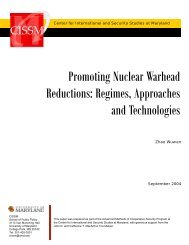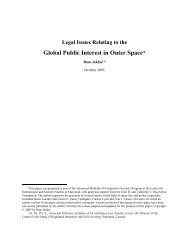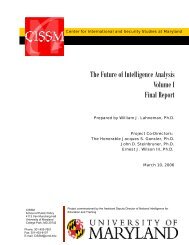A Reassurance-Based Approach to Space Security - Center for ...
A Reassurance-Based Approach to Space Security - Center for ...
A Reassurance-Based Approach to Space Security - Center for ...
- No tags were found...
You also want an ePaper? Increase the reach of your titles
YUMPU automatically turns print PDFs into web optimized ePapers that Google loves.
administration or new appointees who are more focused on other policy issues, so the U.S.government will likely need external encouragement and support <strong>to</strong> turn campaign promisesin<strong>to</strong> policy achievements. While it is <strong>to</strong>o early <strong>to</strong> know what initiatives the Obamaadministration might support and what kinds of military space activities it might be willing <strong>to</strong><strong>for</strong>eclose if others did likewise, it is not <strong>to</strong>o early <strong>to</strong> initiate comprehensive internationaldiscussions intended <strong>to</strong> get the United States, China, Russia and others <strong>to</strong> think seriouslyabout these questions.Of the countries that have been active on space security, Canada is best positioned <strong>to</strong>promote a new diplomatic strategy that uses the complexities of space security as amotivation <strong>for</strong> innovative <strong>for</strong>ms of cooperation rather than <strong>for</strong> unilateral action. Canada issympathetic <strong>to</strong>, but not exclusively focused on, the central concerns advanced by the othermajor players—the Russian and Chinese desire <strong>to</strong> prohibit space weapons, the EuropeanUnion’s emphasis on protecting the space environment, and the U.S. interest in freedom <strong>to</strong>use space <strong>for</strong> legitimate military purposes. As part of its diplomatic identity, Canada hasalready assumed a leadership role on space security while other Middle Powers like Australiaand Japan have devoted more of their diplomatic energy <strong>to</strong> nuclear issues. Canada has alsobeen a successful cooperative security policy entrepreneur be<strong>for</strong>e, advancing the concept of“human security” and pioneering the Ottawa process that produced the landmines ban.This paper seeks <strong>to</strong> stimulate thinking and international discussion about theelements of an advanced cooperative security regime <strong>for</strong> space and about a pragmaticprocess <strong>for</strong> its development. It begins by briefly explaining why the political changes inWashing<strong>to</strong>n do not mean that the time is ripe <strong>for</strong> agreement on a PAROS-style arms controltreaty or a voluntary code of conduct <strong>to</strong> protect the space environment, let alone a standaloneban on kinetic energy anti-satellite weapons (KE ASATs) as some U.S. securityanalysts have proposed. The second section expands on the central insight of a recentCanadian working paper that the dual-use dilemmas created by the global spread of satellite,missile, and missile defense technologies are best addressed through an equitable package ofbehavioral rules that cover both the military and the environmental sides of space security. 5Accomplishing this, though, requires close attention not only <strong>to</strong> desirable new rules, but also<strong>to</strong> the principles behind the rules, the purpose they are intended <strong>to</strong> serve, and the processthrough which they could be developed and applied.The third and fourth sections of this paper propose a different way of thinking aboutthe principles, purpose, and process <strong>for</strong> space security. Framing the central principle of aspace security regime as reassurance, not deterrence or war-fighting, would address the coreconcerns of key players in a way that underscores the need <strong>for</strong> new <strong>for</strong>ms of cooperationand makes them easier <strong>to</strong> achieve. 6 Establishing from the outset a mechanism throughwhich all stakeholders can have their concerns heard and their interests weighed would buildthe confidence and transparency needed <strong>for</strong> increasingly consequential <strong>for</strong>ms of cooperation.5 “On the Merits of Certain Draft Transparency and Confidence-Building Measures and Treaty Proposals <strong>for</strong><strong>Space</strong> <strong>Security</strong>,” Canadian Working Paper, tabled at the Conference on Disarmament on March 26, 2009.6 <strong>Reassurance</strong> and deterrence strategies both seek <strong>to</strong> influence others’ choices by altering their incentives, butdeterrence relies primarily on threats <strong>to</strong> discourage undesirable behavior while reassurance relies more heavilyon positive moves <strong>to</strong> encourage desirable behavior. <strong>Reassurance</strong> can involve unilateral steps, in<strong>for</strong>malreciprocal restraint, or <strong>for</strong>mal agreements.9







